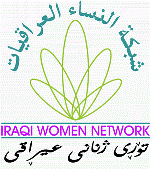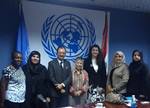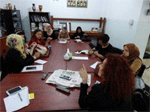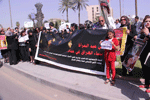Iraq
Published on Mon, 2016-03-07 14:13
As global women movement celebrates International Women's Day on March 8th, while everyone is silent listening to the anthem of freedom and peace, and what has been achieved in progress toward full substantive equality in rights, Iraqi women celebrate this day while they are either internally displaced, refugees, abducted, or as slaves and victims of sexual and physical and community violence, with extreme deterioration of their rights under a scene of growing projects and plans devoted to persecution and the violation of their dignity and degrade of their humanity, with alarming practices of exclusion and marginalization of women in decision-making places, which can be Inferred from the content of the Political Parties Law (No. 36) for 2015, which lacked the inclusion of Women Quota representation at the founding of the party and leadership structures.
March 8th comes this year, with mounting concern, towards serious challenges that faces the country, given the weakness of the State and its institutions, and the escalation of the armed conflict among multiple groups, with the resurgence of violent extremism and terrorism through Daesh (ISIS) control of vast areas of Iraq, corruption and religious and political sectarianism at the State institutions and society levels, and absence of trust between the parties in the political process with the lack of national vision and concept of community reconciliation and social cohesion, as the protest movement widens among our people.
|
Published on Fri, 2015-11-06 17:14
Fifteen years after the adoption of Security Council resolution 1325 on women and peace and security, Iraqi women and girls are being displaced, abducted, enslaved and made victims of sexual and physical violence as a result of the escalating violence. This has increased since June 2014, when one third of Iraq was occupied by gangs of ISIS (Daesh) perpetrating the most heinous crimes, as contained in the report of the United Nations Office of High Commissioner for human rights in March 2015.
In an atmosphere of unbridled violence, weak law enforcement institutions, absence of protection mechanisms and the entrenching of tribal and religious customs and traditions, women are more vulnerable to physical and sexual abuse, domestic violence, and denial of basic rights such as education, along with the emergence of phenomena and harmful practices, such as child marriage, temporary marriage, trafficking in women, so-called honour crimes. Women become the price to pay debts and settle clan disputes rather than be an active element in resolving disputes and negotiations, as stressed in the resolution 1325.
|
Published on Thu, 2015-10-15 13:57
Iraqi al-Amal Association in collaboration with Ala Ali (Independent Researcher/Analyst and Peace Activist) conducted a focus-group based conflict analysis of the Iraqi province of Nineveh. The findings provide important insights into recent developments in Iraq, and the advancement of ISIS.
Several key issues contributing to and sustaining conflict were identified through this research, as were points of entry for peacebuilding, which can be capitalised on to reduce tensions.
|
Published on Fri, 2015-07-24 10:05
Iraqi civil society organizations and women activists, demand support through the work of the UNAMI and the United Nations family. CSOs present a number of proposals for consideration during the upcoming discussions of the UN Security Council on the renewal of the mandate for the United Nations Assistance Mission for Iraq (UNAMI).
Given the current security situation which has continued to deteriorate due to the conflict with ISIL, which is threatening also the security of the whole MENA region and the global security, we are particularly concerned about the situation of women and children, especially those living in areas under military operations and the huge number of IDPs exceeding 4 million. Plus, CSOs are concerned about the gross violation of Human Rights. Reports of sexual violence against women and girls continue to be received and boys continue to radicalized and recruited as terrorist fighters.
|
Published on Fri, 2015-07-03 13:26
The peoples’ uprisings in the Arab region presented a golden occasion for revisiting the European Neighborhood Policy (ENP) and particularly the partnership between the Arab countries and the European Union (EU). The Joint Communication of the High Representative and European Commission, “A New Response to a Changing Neighborhood, ” highlighted important lessons learnt but remained an exercise of self-assessment without the engagement of EU partners and relevant stakeholders (including civil society) for what are widely considered today as major historical changes in the Arab countries.
|
Published on Thu, 2014-09-25 13:35
The new government of Iraq, announced last September 8 by the new Prime Minister Haider al Abadi was resented by the major organizations of Iraqi women because it includes only one woman among its 25 members (22 ministers and three deputy Pms). The Iraqi Women Network expects more women in decision-making positions, as promised by politicians. “It is unfortunate, says IWN that women remain victims of patriarchal bargains in the distribution of ministerial positions and the consolidation of the policy of exclusion and discrimination against women”. The women activists agreed to continue demanding to increase the share of women in the ministries that still have not appointed ministers, as well as deputy ministers within the cabinet, in the chairmanship of the parliamentary committees and in the presidencies of the independent commissions and boards.
|
Published on Thu, 2014-08-21 14:26
Iraqi Al-Amal Association, the Social Watch member in Iraq, mourns with deep sorrow and anguish, the assassination of one of its activists, Saad Abdul Wahab Ahmed.
Unknown terrorists assassinated our Colleague Saad, with silenced guns in Muqdadiyah, Diyala Provence last Monday 18th August. We extend our deepest condolences to his family, friends and colleagues.
|
Published on Tue, 2014-08-12 10:34
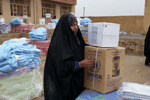
Women of Al-Anbar Iraq. Photo:
UNHCR Iraq
|
Almost eleven years have passed since the US toppled Saddam Hussain’s regime, and Iraq still continues to struggle. In December 2013, Iraq national security forces stormed the private residence of the Iraqi Finance Minister, arresting several of his staff for supporting terrorism. This incident served as a trigger for sectarian violence throughout the Sunni triangle in southern Iraq – Al--‐Anbar Province. It was one of the areas that led peaceful demonstrations on February 2011, but subsequently witnessed the highest amount of sectarian violence, including government security force attacks on civilians.
The recent advancement of Islamic State of in Iraq and Syria (ISIS or Daesh) forces in Mosul and other areas in Iraq has caused great concern about the prospects of peace. Policymakers are scrambling to figure out an appropriate strategy to limit further advancement and prevent further security breakdown.
|
Published on Thu, 2014-04-24 13:00
Ten CSOs are conducting their activities in accordance with the International Standards for domestic election monitoring. In order to support the conduct of free and fair Iraqi Parliamentary and IKR Provincial Councils elections on April 30, 2014, ten Iraqi CSOs from ten different governorates came together to form an informal alliance acting in accordance with the “Declaration of Global Principles for Nonpartisan Election Observation and Monitoring by Citizen Organizations”.
|
Published on Thu, 2014-03-13 14:08
About two dozen Iraqi women have demonstrated in Baghdad against a draft law approved by the Iraqi cabinet that would permit the marriage of nine-year-old girls and automatically give child custody to fathers.
The group's protest was on International Women's Day on Saturday (local time) and a week after the cabinet voted for the legislation, based on Shiite Islamic jurisprudence, allowing clergy to preside over marriages, divorces and inheritances.
|
SUSCRIBE TO OUR NEWSLETTER
Submit

|

